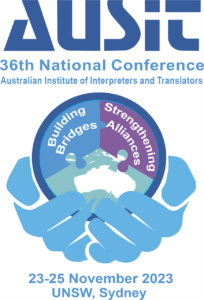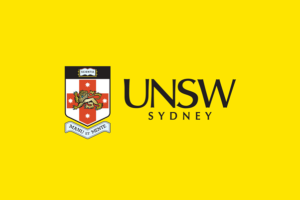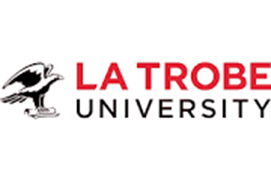Dear Colleagues,
April was another busy month for AUSIT, with progress continuing on all fronts in our campaign to improve the visibility and image of the T&I profession in Australia.
On 30 March I was interviewed on SBS Italian, you can listen to the radio interview (in Italian) here.
AUSIT continues to advocate for the use of professionally qualified T/Is, to educate T&I service users in how best to work with us, and to advocate for appropriate pay rates and working conditions. We are in the process of giving feedback to the Department of Home Affairs on the questions to be included in a survey that the Department will invite translators and interpreters to complete. More information about this will follow in my May newsletter.
No monkeys here
This month we received a report from a translator who had been offered 10c per target word by an LSP. The translation project was part of services the LSP provides to a government agency under a contract. I contacted the relevant government agency and alerted them (as it happens, the project was in one of my working languages and I was well aware of the acceptable rates for this language pair). Needless to say, the agency was really interested to hear about this communication from the LSP. The agency understands the need to maintain sustainability in our industry, yet this practice by a contractor working for them runs against this sustainability.
What is happening? Government agencies go through tender processes and award contracts to LSPs for delivery of T&I services. The LSPs agree to provide whatever is stipulated in those contracts, but do they deliver? Some do, others don’t. The problem is that with no proper feedback mechanism, government agencies are reliant on the information reported by LSPs alone.
This is where we, as AUSIT, can play our part. At the end of the day, government agencies are using taxpayer money to fund services for the community. By definition, they are accountable for the expenditure of these public monies.
You will be familiar with the saying ‘If you pay peanuts, you get monkeys’ – Australian T&I practitioners are not monkeys and we deserve, like all other Australian workers, decent remuneration for professional services. I am committed to fighting exploitative practices and making government agencies aware of what is happening on the ground. That is why it is important that you write to me to tell me what is going on, so I can do something about it. I can raise issues by contacting the government agencies involved to ensure that the LSPs working with them are adhering to best practice. Just complaining is not going to sort things out. Report unsustainable job offers to AUSIT here.
Know your colleagues
AUSIT’s new language division is an opportunity to tackle exploitative practices. How? Simply, it allows for AUSIT colleagues working in the same language pair to get to know each other, compare notes, and consult on terminology, market rates and other issues. We need to put an end to the silo culture that is so prevalent in T&I, with practitioners each doing their job as if they are the only person in the world translating/interpreting from LOTE X into English. The AUSIT Learnbook forum is waiting for practitioners to use it. The Translation Masterclass initiative is waiting for more practitioners to create classes in their particular language pairs. Why are we waiting? If we want change, but expect others to do the work, will anything change?
‘Something is rotten in the state of …’
Shakespeare said Denmark, but in this case it’s Queensland. I’ve received two separate reports from certified practitioners in a tier A language reporting that an LSP holding a contract for the provision of interpreters in health settings in QLD is using untrained, uncertified bilinguals.
This is TOTALLY UNACCEPTABLE. If an LSP cannot find an interpreter for a tier A language (those for which NAATI provides specialist certifications), it should use a bit of introspection to find out what it’s doing wrong. The solution is not to employ bilinguals to do the work that certified practitioners should be doing.
To combat this practice, the National Council are writing to all QLD-based hospitals to alert them to it. Our letter explains the need for appropriate linguistic and interpreting skills, knowledge of specialised terminology, and understanding of appropriate ethical behaviour and professional conduct in T/Is working in health care settings. The only way to OBJECTIVELY ensure that a practitioner possesses the relevant skills and knowledge is NAATI certification. We inform the hospitals of the NAATI certification system and AUSIT’s relevant codes, and point out how using unqualified bilinguals risks the health outcomes and compromises the rights of people in CALD communities. We also advise them of the option to use video remote interpreting (VRI) to access qualified interpreters located elsewhere when face-to-face interpreter supply is an issue, and cite research to support the use of VRI.
I am grateful to the two practitioners who brought this to my attention. Your identities are protected.
If you’ve come across inappropriate hiring practices by an LSP or government agency, please email me here so I can look into it.
From health to the courts and tribunals
We have analysed the first set of feedback received from interpreters working in courts and tribunals, covering the period November 2022 to March 2023. We only received a small number of submissions – from interpreters working in Spanish, Arabic, French, Malay, Mandarin and Persian, spanning NAATI certification levels and working across NSW, QLD, VIC and WA. They covered hearings, sentencing hearings and one ‘other’, working both on site and remotely, in Local/Magistrate’s courts, the District Court, the Federal Circuit and Family Court and NCAT.
The majority of the negative feedback related to unawareness of the professional needs of interpreters in order to undertake their work effectively. It included: lack of briefing, inadequate physical working conditions and incorrect remote interpreting protocols. Some interpreters were treated disrespectfully, and at times the RNS were dismissed.
Some feedback suggested that higher courts treat interpreters better than lower courts, showing more understanding of the interpreter’s role and better providing for their needs. It was encouraging to see positive feedback about some court officers and lawyers who were respectful of interpreters and demonstrated that providing adequate working conditions is possible. The report has been provided to the Judicial Council on Diversity and Inclusion.
It is through reporting good and not-so-good experiences that we can provide evidence to effect change, so please continue reporting your experiences on the interpreter feedback form. Please also forward the link to colleagues and let them know that they don’t need to be AUSIT members to participate.
Industry Affiliates, what next?
The consultation on the Industry Affiliate proposal closed with a total response of:
- 4 practitioners (one not an AUSIT member)
- 3 LSPs and one association of LSPs
- 1 government LSP
- 1 other
- NAATI
Personally, I find the level of response disappointing. If we are going to assess the level of interest by the rate of response, then it would seem that neither practitioners nor LSPs consider this an important move. The next step is for AUSIT’s Ethics and Professional Practice Committee to assess the response and to advise the National Council. Thank you to those who took the time to respond to the consultation.
Q&A with the National President
Thank you to the 52 practitioners who turned up to this online event. I answered, to the best of my ability, questions ranging from working conditions to NAATI examinations. Some were out of my areas of expertise, and hopefully will be addressed by experts in future PDs.
If the feedback is positive, we may do this again in four or five months.
Volunteering time
In the April newsletter I referred to the new opportunities to volunteer on an AUSIT committee. You can find information about the committee restructure here, and the form to express your interest here.
Remember that the more often we as members do a little bit for AUSIT, the more AUSIT will be able to achieve. If you can give a few hours a month to AUSIT, fill out the form. We hope to start the new committees in the new financial year.
To end my intro with a morale boost, take a look at the recent media release by the Hon. Andrew Giles MP, Minister for Immigration, Citizenship and Multicultural Affairs, on the Federal Government’s decision to transition 50 TIS National call centre causal positions to permanent (see Reading Corner, below).
Branch News
WA Branch News
… as reported by Mary Street
On 22 April, AUSIT WA hosted a PD Webinar titled ‘Interpreters Working with Refugees and Trauma Survivors: an information session with ASeTTS’, presented by Fiona Reid, Executive Manager of Client Services – ASeTTS (the Association for Services to Torture and Trauma Survivors) at the Citiplace Community Centre in Perth.
Thirty-five members attended. The presentation was well received and there was good interaction by the members.
After the presentation, attendees were divided into three groups, and a special topic was given to each group to discuss among themselves. The results of the discussions were then shared among the broader group.
A big thank you to Nora Pucci, AUSIT WA PD Coordinator, for organising this important and informative webinar session.
Here are some pictures from the session:


AUSIT PD & Events
CLICK ON THE BUTTON below for more information and the registration links: |

Interpreter Dissatisfaction and the Impact on CALD Community Health Access
ASLIA and AUSIT will co-present a talk titled ‘Interpreter Dissatisfaction and the Impact on CALD Community Health Access and Outcomes’ at the Queensland Multicultural Health Symposium at the end of May, to highlight issues in the industry.
A recent report into interpreter satisfaction (2022) identified critical issues in the profession of spoken and sign language interpreting and the provision of language services by the Queensland Government, including within hospital and health services. The issues identified within the report highlight risks to patient safety and health outcomes, and gaps in the provision of equitable and accessible health services. This presentation will present the key findings from the report and discuss strategies for how to work effectively with language service providers and interpreters, in order to improve the accessibility of hospital and health services and ultimately improve the experiences and health outcomes of CALD communities.
Find out more and register here.

AUSIT National Conference 2023
When: 23–25 November
Where: University of New South Wales (Kensington campus), Sydney
The theme of this year’s conference is:
Building bridges, strengthening alliances:
Translation and Interpreting in today’s connected world
The Organising Committee has been busy preparing a Call for Abstracts, which will be released on the AUSIT website soon. We are looking forward to sharing more details with you in the coming months about the in-person events.
EXTERNAL PD & Events
All information below is provided by external organisations. Please register and direct any enquiries to the relevant contact outlined in each announcement, rather than to AUSIT.

2M Academy: Speaking up for Health Equity webinar
What role does language play in achieving health equity in Australia? How can health services enable time-critical language access to engage and empower CALD patients?
We invite you to join us in the upcoming webinar ‘Speaking Up for Health Equity’, where a panel of health services, interpreters and language service providers will come together to explore the current roadmap to achieving health equity. Meet the speakers here.
In this webinar, you will learn:
- challenges faced by healthcare providers in providing inclusive care
- interpreting solutions to improve outcomes for CALD healthcare consumers, including onsite and remote interpreting (scheduled or on demand)
- best practices for engaging interpreters in telehealth settings
Unable to attend live? We encourage you to still register to receive the recording after the session.
When: 4 May, 12pm AEST | 11:30am ACST | 10:00am AWST
For more information and to register, click here.

Ethnolink webinar: Maximising Your Translation Budget
From language selection to ensuring efficient translations, explore how you can best use your translation budget to deliver high quality multilingual content to your audience.
When: 9 May, 2–3 pm (AEST) / 12–1 pm (AWST)
Find out more here.

ASLIAQ ethics PD weekend (F2F and online)
ASLIA Queensland is presenting a weekend of ethics PD workshops.
When: 10–11 June
Where: Cairns (face to face), plus sessions 1 and 2 can also be attended online via Zoom
Presentation language: English
Click here to find out more.
AUSIT members are eligible for a member discount. To get the discount, emailqldinfo@aslia.com.au and include:
- your name
- which session(s) you want to register for
- whether you want to attend by Zoom or face to face (NOTE: Session 3 not available on Zoom).

Free sexual and reproductive health training
When: Tuesday 13 June
Where: Brisbane (True Relationships and Reproductive Health’s Windsor office)
Are you an interpreter and/or translator working in a clinical or healthcare setting? Join True Relationships and Reproductive Health for face-to-face training where you will learn tools and strategies for communicating with clients about aspects of reproductive and sexual health.
Register here.
Not in Brisbane? True also has online training options aligned to NAATI PD points.
International Symposium on Bilingualism (ISB14)
In 2023, the biennial hybrid symposium will be hosted by Macquarie University, Sydney
When: 26–30 June
Click here for more information.
XIV Legal Translating and Interpreting International Forum (FIT-ILF 2023)


NAATI Interpreting in NDIS Settings program
NAATI’s free specialised Interpreting in NDIS Settings training program – funded by the National Ethnic Disability Alliance (NEDA) and co-designed by NEDA and RMIT University’s T&I Program – consists of 6 self-paced modules and 2 live webinars.
RMIT is repeating the two webinars:
Webinar 1 – Best interpreter is invisible and non-interactive. Or is it?
Monday, 24 July 2023, 3–4.15 pm AEST
Webinar 2 – Demand and control schema to support ethical decision making
Monday, 28 August 2023, 3–4.15 pm AEST
To find out more about the program click here.
To take part, create a NAATI Learn account and enrol.
If you have any questions or suggestions regarding the modules and webinars, please contact NEDA’s Project and policy officer Lyn Wu.

Post-graduate T&I Programs at UNSW - new languages
The University of New South Wales is introducing new languages in their suite of post graduate Interpreting and Translation programs.
The languages offered from 2023 are: Cantonese, French, Greek, Indonesian, Italian, Japanese, Korean, Mandarin, Portuguese, Russian, Serbian, Spanish, Turkish
The programs are Commonwealth supported – making them very affordable – and can be taken fully online. The programs include Graduate Certificate, Graduate Diploma and Master’s degrees.
Applications still open. To apply, please click here.
For more information about the programs, please click here.
For any course-related queries, please contact Prof. Sandra Hale via email here.

Launch of Australia's only Punjabi Translation & Interpreting Higher Education Course
RMIT is launching a Punjabi Translation and Interpreting Course! Interested candidates can commence study in Semester 2, 2023.
Next intake: July
Click here to learn more.
CALLS FOR PARTICIPANTS

Research study: Culturally and linguistically diverse aphasia rehabilitation
Participate in a La Trobe University project about interpreters’ experience of working with speech pathologists to provide aphasia therapy.
Click here to learn more.

What do you need to know before interpreting for the family of a child who is deaf?
We are looking for interpreters to complete a 5–10 minute survey about what they need to know before interpreting for the families of young children with hearing loss in health and education settings. This study is aimed at interpreters who work between spoken languages, not Auslan interpreters.
Click here to complete the survey.

Survey on fair compensation in post-editing
My name is Greta Maniero, and I am a student enrolled in the Master’s degree program in Modern Languages for Communication and International Cooperation at the University of Padua (Italy). For my thesis project, I have written a questionnaire to investigate, on the one hand, the perception of post-editing among the general public, and on the other hand, what is the fairest payment method for this job, according to post-editors.
Please click here to fill out the survey.
AUSIT OPPORTUNITIES
Website moderators wanted
AUSIT is putting together a list of volunteers to chair and moderate online webinars. It is a great opportunity for you to gain NAATI recertification points under the industry engagement category, and also develop new skills (or finetune existing ones).
As a chairperson/moderator your duties will include:
- introducing presenters
- acknowledgement of country
- other housekeeping
- keeping an eye on the chat and answering questions there.
Advantageous skills to have will include:
- knowledge of Zoom
- public speaking skills
- timekeeping skills.
If you are interested, please reach out to the PD Coordinator here.
Training will be provided in June.
Deadline to apply: Friday 12 May, 5pm AEST.
Open to all AUSIT members regardless of your location in Australia.
READING CORNER: interesting articles & journals
As you can see, we are working hard for our professional community. We can do much more if you join us by volunteering a little of your time. Whether you’ve been in AUSIT for 25 years or 25 days, what’s important is your willingness to help and your personal experience as a T/I. Thank you. You can find the list of new committees we want to start in July 2023 here, and the form to express your interest in joining a committee here.
J. Angelo Berbotto
AUSIT National President

Supporting Professional Standards visit our website | follow us on Twitter This communication direct from AUSIT is part of your membership benefits Please do not reply to this email, it is an un-monitored email account. |
Copyright © 2020 AUSIT, All rights reserved. |


